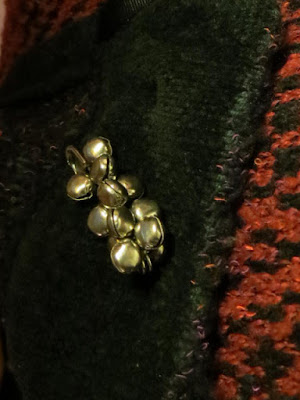Yes, that’s a contentious headline for today’s post, but what I
have to say may surprise anyone looking for an indictment of religion, this or
any other. Read on. Agree or disagree? Let me know.
This is Black History Month. If I ever read the Narrative
of the Life of Frederick Douglass, an American Slave, it was a long time
ago, so that’s the book I chose to begin in this first week of February. It
is not pleasant reading: Douglass tells stories of life under slavery that rival
the horrors of 20th-century concentration camps. It’s hard to say
what the “worst” of these horrors might have been, but the author singles out
religious slave-owners as the cruelest:
In August, 1832, my master attended as Methodist camp-meeting held
in the Bay-side, Talbot county [Maryland], and there experienced religion. I
indulged a faint hope that his conversion would lead him to emancipate his
slaves, and that, if he did not do this, it would, at any rate, make him more
kind and humane. I was disappointed in both these respects. It neither made him
to be humane to his slaves, nor to emancipate them. If it had any effect on his
character, it made him more cruel and hateful in all his ways; for I believe
him to have been a much worse man after his conversion than before. Prior to
his conversion, he relied upon his own depravity to shield and sustain him in
his savage barbarity; but after his conversion, he found religious sanction and
support for his slaveholding cruelty.
– Frederick Douglass, Narrative of the Life of Frederick Douglass, an
American Slave
When young Frederick’s ownership passes out of the family
following several owners’ deaths, and when after that he is released from
bondage to a cruel “breaker” of slaves, he eventually comes to “the best master
I ever had, till I became my own master,” a certain Mr.
Freeland.
Another advantage I gained in my new master was, he made no
pretensions to, or profession of, religion; and this, in my opinion, was truly
a great advantage. I assert most unhesitatingly, that the religion of the south
is a mere covering for the most appalling barbarity – a sanctifier for the most
hateful frauds – and a dark shelter under, which the darkest, foulest,
grossest, and most infernal deeds of slaveholding find the strongest
protection. Were I to be again reduced to the chains of slavery, next to that
enslavement, I should regard being the slave of a religious master the greatest
calamity that could befall me.
This apparent indictment of religion comes from the first-hand experience of one born into slavery, who knew various masters, and who did not escape to freedom until
his 21st year.
Is religion then to be cited as a cause of cruelty, a logical
rationale for slavery, just as many indict it as a cause of war? I have
written about religion and war on another occasion, so anyone who knows me or has read this blog will not be
surprised by my position, which is that while certain teachings may, under the
guise of religion, help rationalize slavery or war, religion itself,
Christianity or any other, does not provide the initial idea or impulse. If it
did, how to explain the Abolitionist movement in the North, predominantly
inspired by religion, “professing that slaveholding was incompatible with
Christian piety”?
How to explain the deep faith felt by Frederick Douglass
himself?
In order to make my case, I must briefly leave the slave
narrative and even the issue of slavery in American history and turn to a field
of current research that will at first seem far removed from my main subject.
The research field is that of reasoning and statistics and how our intuitions
lead us into hasty conclusions we are persuaded to abandon only rarely and
reluctantly. The book laying out this story (less dramatic from one point of
view but relevant to every single living human being) is Daniel Kahneman’s Thinking
Fast and Slow (Farrar, Straus & Giroux, 2011).
Let’s start with Kahneman’s statement that our minds prefer
causal explanations to statistically more accurate explanations. In a golf
tournament, for example, a player who does well on Day 1 will generally not do
as well on Day 2, whereas a player who performed badly on Day 1 will generally
improve on Day 2. Statistically, this is explained by a law called “regression
to the mean,” a law of demonstrated predictive value that runs so counter to our
intuitions that we invariably prefer to “explain” the deterioration or
improvement with causal stories. During one Winter Olympics, Kahneman writes,
I was startled to hear the sportscaster’s comments while athletes
were preparing for their second jump: “Norway had a great first jump; he will
be tense, hoping to protect his lead and will probably do worse” or “Sweden had
a bad first jump and he knows he has nothing to lose and will be relaxed, which
should help him to do better.” The commentator had obviously detected
regression to the mean and had invented a causal story for which there was no
evidence.
The less
evidence we have for a prediction, Kahneman instructs us, the more we need to
realize the bias of our expectation that the future will replicate the past,
and the more we need to moderate predictions by allowing for regression to the
mean.
The business of predicting sports outcomes seems very far, I realize, from any
story about religion and cruelty, so I need another piece from the statistician’s
bag of tricks, namely that the more extreme a case, the greater likelihood of
regression to the mean. Kahneman makes up a news story, “Depressed children
treated with an energy drink improve significantly over a three-month period”
and says the claim it makes is perfectly true. Because depressed children
constitute an extreme group, there is every likelihood that they will show
improvement three months later, and this would be the case no matter what they
did during those three months. It is only our human preference for causal
stories that makes us want to attribute improvement to the energy drink. This
is the reason that a control group is necessary to establish a causal link.
Returning
to the original question about cruel slave-owners professing Christianity, I am
certainly not going to try to explain them out of history, but I want to contrast
them, one extreme group, with another extreme group, the Quaker Abolitionists
in the North. If we look at a group comprising all professing American Christians
during the 1830s, both the Quaker Abolitionists and the cruel slave-owners can
be seen as extremes on opposite ends of a Christian continuum of reaction.
Obviously, then, Christian principles and beliefs alone cannot be said to cause both
a defense of the cruelest practices of slavery and a spirited and dedicated
attack on the same institution (and neither would the cool-headed, rational
statistician be surprised to find the most behavior change at the two extremes).
But this
is unsatisfying, isn’t it? Statistics, while demonstrable, give us no
explanation at all and leave us with nothing whatsoever to conclude about the
relation of religious belief to behavior. This is where I want to put forward
my own theory--untestable but not incongruent with either the experience of
Douglass or the research of Kahneman—that it was the cognitive dissonance
created by the conjunction of Christianity and slavery that drove one group of
slave-owners to outrageous cruelty while simultaneously driving religious
Quakers to take up the Abolitionist cause.
The term
‘cognitive dissonance’ does not appear in Kahneman’s book, but he does discuss
cognitive ‘ease’ and ‘strain.’
Anything that makes it easier for the associative machine to run
smoothly will also bias beliefs. A reliable way to make people believe
falsehoods is frequent repetition, because familiarity is not easily
distinguished from truth.
The reflective mind, in an attempt to resolve a contradiction or
eliminate dissonance, will always reach first for a familiar bias. Slaveholders
and Quakers began with different biases and thus naturally reached different
conclusions, just as those who initially believe religion’s effects are
beneficial will reach different conclusions from those who initially believe
religion’s effects are harmful. Is religion, then, neutral? What do you think?
The institution of slavery was decidedly not neutral. Douglass describes his yearning
for knowledge and freedom, his feeling of being “broken in body, soul, and
spirit,” and then finding within himself the strength again to resist.
The battle with Mr. Covey was the turning-point in my career as a
slave. It rekindled the few expiring embers of freedom, and revived within me a
sense of my own manhood. It recalled the departed self-confidence, and inspired
me again with a determination to be free. The gratification afforded by the
triumph was a full compensation for whatever else might follow, even death
itself. He only can understand the deep satisfaction which I experienced, who
has himself repelled by force the bloody arm of slavery. I felt as I never felt
before. It was a glorious resurrection....
Both the slave and the slave-owner lived slavery’s
contradiction in the mind, but the slave lived it also in his
body. Little wonder that daily experiencing of such a contradiction would
drive many masters to cruelty, alcoholism, or both; less wonder that the hunger for freedom could never be eradicated in the slave.
Douglass remarks that while some
think there could be no fellow feeling among slaves, he found his fellow slaves
“noble souls.”
We were linked and interlinked with each other. I loved them with a
love stronger than any thing I have experienced since. ... I believe we would
have died for each other.
Common experience, recognition of one another as human beings, and their shared desire for freedom for knowledge and freedom bound them to each other.
-- Here I must leave off for today. I am less than halfway
through Douglass’s and Kahneman’s books, and my whole tying together of the two
is probably premature, but I cannot help trying to bring together these two
very different books I am presently reading, going from one to the other with a
fascinated mind....






